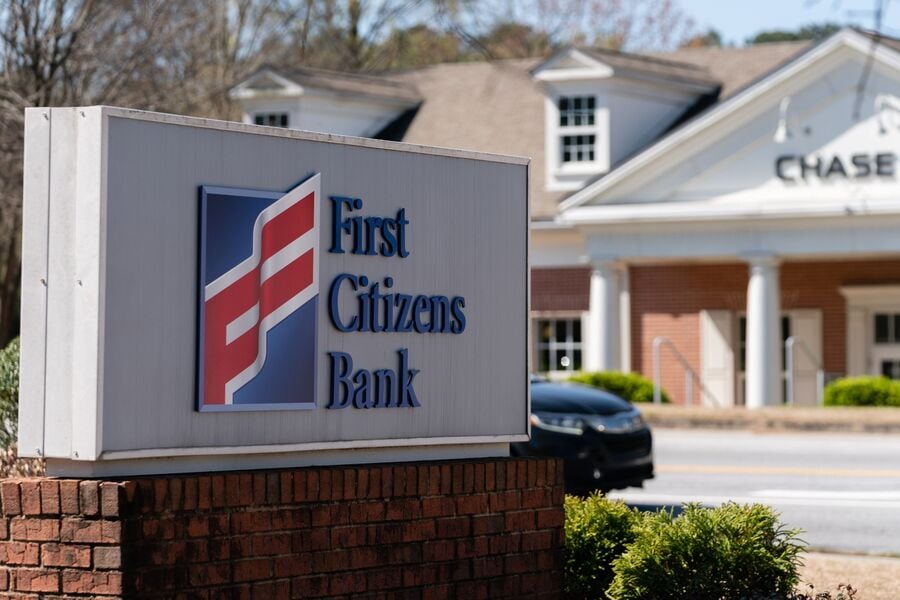

First Citizens BancShares Inc. agreed to buy Silicon Valley Bank, which was seized by regulators following a run on the lender.
The deal to settle SVB’s fate could help tamp down some of the turmoil that has engulfed the financial world, and shares of regional banks rallied on the news, with First Citizens up 44%.
The acquisition transforms First Citizens into one of the top 15 U.S. banks, according to Bloomberg Intelligence, with help from some favorable terms. First Citizens is buying about $72 billion of SVB’s assets at a discount of $16.5 billion, according to an FDIC statement.
This leaves about $90 billion in securities and other SVB assets in the hands of the FDIC, and an estimated cost of the failure to the Deposit Insurance Fund of about $20 billion. Meanwhile, the FDIC gets equity appreciation rights in First Citizens with a potential value of $500 million.
About $90 billion in securities and other assets will remain in the receivership for disposition by the FDIC, while the federal institution also got equity appreciation rights in First Citizens worth as much as $500 million. The estimated cost of the failure to the Deposit Insurance Fund is about $20 billion, though the exact extent will be determined when receivership is terminated, according to the statement.
Silicon Valley Bank unraveled in less than 48 hours earlier this month after outlining a proposal to shore up capital. When that plan failed, a run on deposits forced the lender to take huge losses on sales of securities that had lost value as interest rates climbed. Shares of regional lenders across the U.S. have plummeted amid concern they too could fall victim to the same threats that destroyed SVB.
“This has been a remarkable transaction in partnership with the FDIC that should instill confidence in the banking system,” Frank Holding Jr., chief executive of Raleigh, North Carolina-based First Citizens, said in a statement. Bloomberg News reported earlier that First Citizens was nearing a deal.
The lender said it will assume $56 billion in deposits and 17 legacy branches will begin operating as Silicon Valley Bank, a division of First Citizens. There will be no immediate change to customer accounts.
The transaction is the second FDIC-assisted deal that sent shares of the acquirer soaring. New York Community Bancorp surged 32% on March 20 after taking over deposits and some of the loans at Signature Bank, which was seized by federal regulators on March 12. U.S. authorities have been trying to avoid deals that look like bailouts.
Holding said SVB has complementary businesses, including private banking, wealth and small business banking. The deal will also extend First Citizens’ reach into venture capital and technology businesses, he said.
“We are excited about layering on the expertise that SVB brings,” he said. “We will have strong liquidity and strong capital.”
Regulators had been racing to lock down a deal for all or parts of the bank in a bid to cover the uninsured deposits of its startup customers, but an earlier auction attempt passed without a buyer.
Then the FDIC extended the bidding process after receiving “substantial interest” from multiple potential acquirers. To simplify the process and expand the pool of bidders, the FDIC allowed parties to submit separate offers for the Silicon Valley Private Bank subsidiary and Silicon Valley Bridge Bank NA — the firm created by the FDIC after SVB went into receivership.
Valley National Bancorp also submitted a bid last week, people familiar with the matter have said.
First Republic Bank led a rally across regional lenders in U.S. premarket trading on Monday as sentiment improved following a Bloomberg report that U.S. authorities are considering more support for banks.
U.S. authorities had taken extraordinary measures to shore up confidence in the financial system after the bank’s collapse, introducing a new backstop for banks that Federal Reserve officials said was big enough to protect the entire nation’s deposits.
Shares of SVB had plummeted after the Santa Clara, California-based company outlined plans for an equity offering, disclosed it had suffered a $1.8 billion loss on the sale of securities and a slowdown in funding at the venture capital-backed firms it serves. The bank was forced to abandon its plan to raise capital as funds including Founders Fund, Coatue Management, Union Square Ventures and Founder Collective began advising their portfolio companies to move money out of SVB.
First Citizens previously submitted a bid for SVB immediately after it collapsed, according to people familiar with the matter.
Its interest in an acquisition has stumped some observers, who questioned whether First Citizens has the wherewithal to take on the second-largest FDIC-assisted bank failure in U.S. history. First Citizens, based in Raleigh, North Carolina, was the 30th largest commercial bank in the U.S. by assets at the end of 2022, according to Federal Reserve data.
But the bank has experience buying broken rivals. It has acquired more than 20 FDIC-assisted banks since 2009, striking a series of deals after the financial crisis from Washington to Wisconsin to Pennsylvania.
First Citizens also completed the acquisition of CIT Group Inc. last year in a deal valued at more than $2 billion.

Relationships are key to our business but advisors are often slow to engage in specific activities designed to foster them.

Whichever path you go down, act now while you're still in control.

Pro-bitcoin professionals, however, say the cryptocurrency has ushered in change.

“LPL has evolved significantly over the last decade and still wants to scale up,” says one industry executive.

Survey findings from the Nationwide Retirement Institute offers pearls of planning wisdom from 60- to 65-year-olds, as well as insights into concerns.
Streamline your outreach with Aidentified's AI-driven solutions
This season’s market volatility: Positioning for rate relief, income growth and the AI rebound
